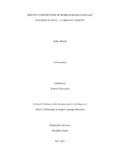
Please use this identifier to cite or link to this item:
https://hdl.handle.net/20.500.14301/124| Title: | IDENTITY CONSTRUCTION OF WOMEN ENGLISH LANGUAGE TEACHERS IN NEPAL: A NARRATIVE INQUIRY |
| Authors: | Mainali, Sudha |
| Citation: | MainaliI,S(2021)Identity construction of women english language teachers in Nepal: A narrative inquiry. |
| Issue Date: | Jul-2021 |
| Publisher: | Kathmandu University School of Education |
| School: | SOED |
| Department: | DOLE |
| Level: | M.Phil. |
| Abstract: | This research study explores the identity construction process of women English language teachers in Nepal. Exploring the narratives and making sense of women English language teachers’ identity construction in teaching was seemingly a significant research agenda. To this realization, the study explored the growing concern of identity construction of women English language teachers in Nepal. Its purpose was to seek an understanding of the impact of socio-cultural settings on women English language teachers to gain power, self-position, and socio-professional recognition. The study took theoretical references from the Identity and Language Learning Theory of Norton (2013). The study employed an extensive study of relevant literature that made my research more valid, relevant, and meaningful. My research relied on a narrative inquiry. In this sense, I was conscious that the ideas are multiple, and no interpretation is fixed. It attempted a series of in-depth interview sessions with six women English language teachers. The participants of this research were very enthusiastic perceiving interesting experiences carrying the story of gain and pain, challenges, changing, and growing concerning wider language ideologies and subjectivity generating own personal, social, and professional identity. They created different statuses of being independent, pertaining own identity with confidence, self-esteem, and warm motivation in language learning and teaching. It is found that teachers are regarded as path setters, facilitators, leaders, and ideal scholars whose professional identity could not build without prolonged engagement and the quality of teaching could not be effective. For this, they should be able to invest in language and grow with knowledge, skills, and new techniques being professional which seemed a hindrance to women English language teachers due to patriarchal structures and socio-cultural territory in the context of Nepal. It would help them to gain access to the global perspective of teaching. However, it is a difficult situation for women who should be able to minimize problems, tensions, and high-level duties being insider and outsider with the expectation of society then they could be able to contribute to language teaching institutions performing in the society. This study subscribes to the field of English language teaching in mainstream and women English teachers whose way is to construct their identities as English language teachers. This research study more clearly depicts the detail that women English teachers' socio-cultural background, socio-economic status, family status, educational movement, individual/professional practices of a person ushers’ distinctions to distinguish English teaching identity to women English teachers. The destiny they approach from, in a similar pattern they enhance their English language teaching-learning identity and perform effectively in their profession. |
| URI: | http://101.251.6.110:8080/handle/20.500.14301/124 |
| Appears in Collections: | Dissertation |
Files in This Item:
| File | Description | Size | Format | |
|---|---|---|---|---|
| Sudha Mainali Final Thesis.pdf | 1.35 MB | Adobe PDF |  View/Open |
Items in DSpace are protected by copyright, with all rights reserved, unless otherwise indicated.